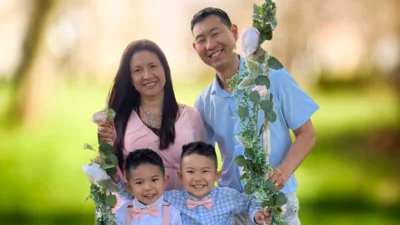Adventist La Grange Memorial Hospital issued the following announcement on Nov. 29.
We’re all at risk of being “overcooked” by holiday stress. Whether you’re a host or a guest, going out or staying in, spending time with others or alone, a variety of complicated factors can impact our moods and stress levels. What will I serve for dinner? What if there is a scheduling conflict? What if I don’t get the right gift? What if I invite too many people and their flights are delayed by snow and I’m trapped in the kitchen with Aunt Judy and her many, many political opinions?
When stress levels are high, our health worsens both physically and psychologically. That’s why it is so important to recognize when we’re feeling overwhelmed and to take care of ourselves during the holidays.
Here at the AMITA Health Center for Mental Health, we help people overcome these kinds of stressors every day using a variety of evidence-based coping strategies and thought exercises. I hope you will find these helpful for dealing with any kind of holiday stress:
Watch Out for “Shoulds”
Often, the source of our holiday stress is not the actual event but rather our expectations for how that event should happen, or how other people should act. We might dream of living a Hallmark Channel movie, but the reality is that infants might cry in church, not every present will be met with excitement and the turkey might come out dry.
To help prevent these cognitive sinkholes, it is important to listen to yourself and what you are telling yourself. Buzzwords to watch out for include “should,” “must” and “have to” as these are definitive terms that do not allow for any flexibility to view or understand a situation in any other way.
Instead, practice using terms like “it would be nice if…” or “I would prefer that.” This will allow you to recognize your expectations for a situation while still understanding that things do not always go the way you want them to.
‘Tis the Season to Be Transparent
You’re not the only person who might have unrealistic expectations about the holidays. Kids can be especially vulnerable to this when it comes to gifts. If the threat of disappointment or a total meltdown on Christmas morning is compounding the holiday stress you’re already feeling, transparency is the best policy.
Be open about what (and how much) your kids should expect. Here’s one way you might go about this: help your kids write their wish list. Help them prioritize what’s important to them (“If you could ask Santa for only one thing, what would it be?”) and find creative ways to steer them away from anything too unrealistic (“If Santa gave you all that, he wouldn’t have any toys for the other kids”). You can even turn it into a teachable moment about what it truly means to give. Have your kids pair their wish list with a “donation list” and ask them what they’d give from their list to a child in need. Have them give those items (or a monetary equivalent) to a favorite charity. Perhaps Santa could even leave a letter thanking them for their generosity!
Give the Gift of Radical Acceptance
Money is a perennial source of stress, and it becomes especially acute around the holidays as bills pile up for presents, food and more. Luckily, the solution is free.
“Radical acceptance” is a term used to describe the moment when you stop fighting reality and accept it completely. Not resign yourself to it, but truly accept it with your mind, heart and soul. By living and breathing an “it is what is” mindset, you’ll be surprised at how creative you can get within a limited budget.
The holidays can be expensive, but they don’t have to be. If you are hosting, perhaps you could buy “heat and eat” items on sale ahead of time. Better yet, invite your guests to each bring a dish to share in the experience (and costs)! The reason for the season is to be with the ones you love. None of your guests will be looking around for a price tag.
Cognitively Rehearse Your Worst-Case Scenarios
When we’re in a stressful situation, it’s easy for the mind to catastrophize and jump to the worst possible outcome. Unfortunately, this kind of “all or nothing” thinking can be its own self-fulfilling prophecy.
Take some time beforehand to cognitively rehearse what you think your experience will be like and how you will react or respond to various situations that might arise. If the roast burns, order Chinese food. If there’s a delay in your Amazon delivery, find alternative gifts at a local store and return your delivery later.
This kind of practice will make the real deal much easier to navigate. You can even cognitively rehearse how you will reward yourself afterwards. Plan to watch your favorite holiday movie, indulge in your favorite late-night snack or just spend some time alone with your pet!
May Your Days Be Mindful and Bright
We all have people in our lives who push our buttons. Many of us dread being forced to spend time with them during the holidays. If this sounds like you, make mindfulness your best friend.
Mindfulness is the art of living in the moment and not being bound to your memories of the past or your concerns about the future. You can find many mindfulness exercises online, but I particularly like one that involves the simple power of observation. For example, when you are feeling dread or stress, pick an object to look at — a holiday cookie, let’s say. Instead of a passing glance, focus on that cookie for a moment and do nothing else but focus on it. Explore its every nook and cranny. Notice the sprinkles, frosting, shape and texture. Block everything else out and allow this moment to be about nothing else. This cognitive “time out” helps us regain our thoughts and composure during stressful times.
Make Time for the Ghosts of Christmas Present
If you’ve lost a loved one during the past year, the first holiday season without them can be especially difficult. It can seem like everywhere you look you’ll find painful reminders that they’re not there. It’s not unusual for people to feel guilty that they’re grieving during a time of year when everyone is happy.
It is OK and natural to feel sad from a loss. So instead of thinking that you cannot experience sad emotions, accept them — but give yourself some control by allotting a time in the day to go ahead and experience them. If you have company coming over, try and schedule a time for yourself a few hours prior where you can think about your loved one purposefully. Look at the old photo albums, cry, pray, give in to your emotions fully. Doing so can be quite cathartic, which in turn can help you maintain composure later on when you’re with company.
Happy Holidays or Bah Humbug?
Which sentiment will define your season? Hopefully, these coping strategies help you manage your holiday stress. But if your stress levels are more than you can manage on your own — if you are experiencing deep depression, despair or thoughts of suicide — or if you would like to learn more about coping strategies for stress and anxiety, you might need help from someone who cares. Please call us right away if that is the case.
Original source can be found here.

Source: Adventist La Grange Memorial Hospital






 Alerts Sign-up
Alerts Sign-up